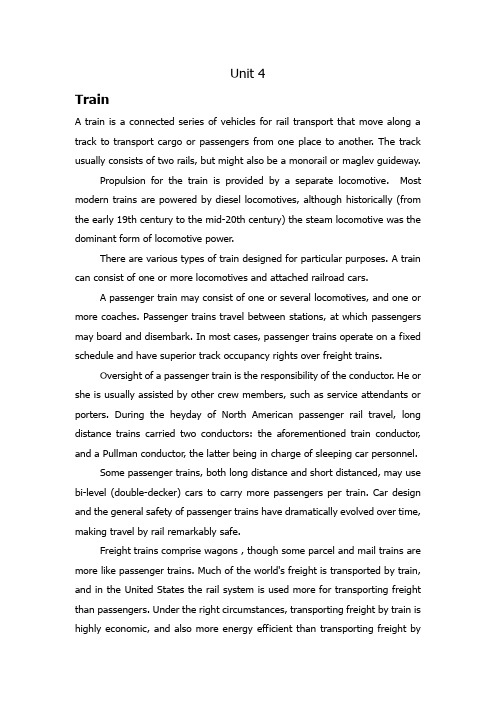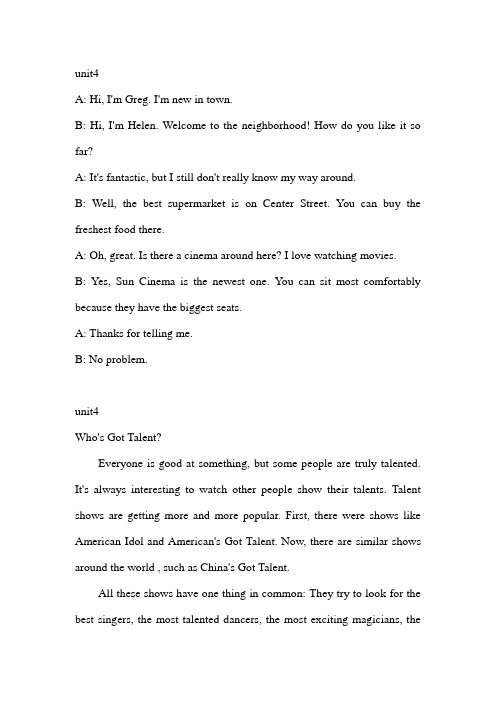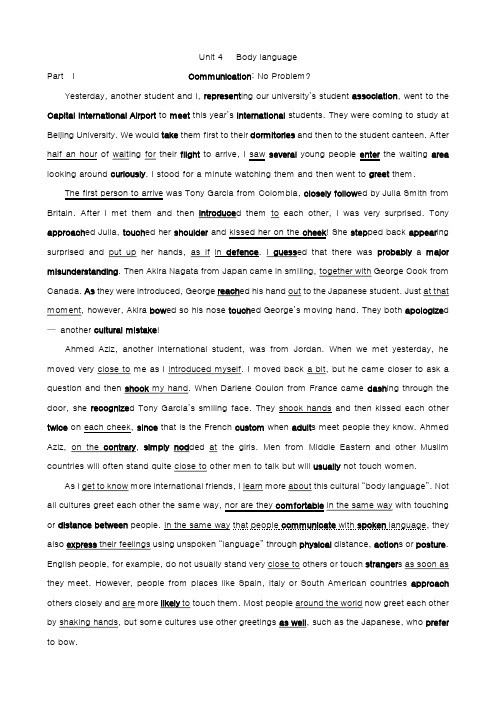unit4课文
高职高专实用英语Unit 4课文+译文

Unit 4TrainA train is a connected series of vehicles for rail transport that move along a track to transport cargo or passengers from one place to another. The track usually consists of two rails, but might also be a monorail or maglev guideway.Propulsion for the train is provided by a separate locomotive. Most modern trains are powered by diesel locomotives, although historically (from the early 19th century to the mid-20th century) the steam locomotive was the dominant form of locomotive power.There are various types of train designed for particular purposes. A train can consist of one or more locomotives and attached railroad cars.A passenger train may consist of one or several locomotives, and one or more coaches. Passenger trains travel between stations, at which passengers may board and disembark. In most cases, passenger trains operate on a fixed schedule and have superior track occupancy rights over freight trains.Oversight of a passenger train is the responsibility of the conductor. He or she is usually assisted by other crew members, such as service attendants or porters. During the heyday of North American passenger rail travel, long distance trains carried two conductors: the aforementioned train conductor, and a Pullman conductor, the latter being in charge of sleeping car personnel.Some passenger trains, both long distance and short distanced, may use bi-level (double-decker) cars to carry more passengers per train. Car design and the general safety of passenger trains have dramatically evolved over time, making travel by rail remarkably safe.Freight trains comprise wagons , though some parcel and mail trains are more like passenger trains. Much of the world's freight is transported by train, and in the United States the rail system is used more for transporting freight than passengers. Under the right circumstances, transporting freight by train is highly economic, and also more energy efficient than transporting freight byroad. Rail freight is most economic when freight is being carried in bulk and over long distances, but is less suited to short distances and small loads.译文列车列车是铁路运输中连接起来的一组车辆,它们在轨道上行驶,从一地向另一地运输旅客或货物。
八上英语unit4 课文原文

unit4A: Hi, I'm Greg. I'm new in town.B: Hi, I'm Helen. Welcome to the neighborhood! How do you like it so far?A: It's fantastic, but I still don't really know my way around.B: Well, the best supermarket is on Center Street. You can buy the freshest food there.A: Oh, great. Is there a cinema around here? I love watching movies.B: Yes, Sun Cinema is the newest one. You can sit most comfortably because they have the biggest seats.A: Thanks for telling me.B: No problem.unit4Who's Got Talent?Everyone is good at something, but some people are truly talented. It's always interesting to watch other people show their talents. Talent shows are getting more and more popular. First, there were shows like American Idol and American's Got Talent. Now, there are similar shows around the world , such as China's Got Talent.All these shows have one thing in common: They try to look for the best singers, the most talented dancers, the most exciting magicians, thefunniest actors and so on. All kinds of people join these shows. But who can play the piano the best or sing the most beautifully? That's up to you to decide. When people watch the show, they usually play a role in deciding the winner. And the winner always gets a good prize.However, not everybody enjoys watching these shows. Some think that the lives of the performers are made up. For example, some people say they are performers but in fact, they are just actors. However, if you don't take these shows too seriously, they are fun to watch. And one great thing about them is that they give people a way to make their dreams come true.。
人教版九年级英语Unit4课文原文

Unit4Section A 2dAlfred: This party is such a great idea!Gina: I agree.It's been three years since we last saw our primary school classmates.Alfred: It's interesting to see how people have changed.Gina: Billy has changed so much! He used to be so shy and quiet. Alfred: Yeah, his face always turned right when he talked to girls! Gina: I used to see him reading in the library every day.Alfred: That's because he was a really good student. He studied hard and got good scores on his exams.Gina. Did he use to wear glasses?Alfred: Yes, and he used to be thin, too. But look how big and strong he is now!Gina: He is so popular now. Look at all the girls around him!3 aRead the passage and put the sentences A-D in the correct places.From Shy Girl to Pop Star1 For this month's Young World magazine, I interviewed 19- year- old Asian pop star Candy Wang. Candy told me that she used to be really shy and took up singing to deal with her shyness. As she got better, shedared to sing in front of her class, and then for the whole school. Now she's not shy anymore and loves singing in front of crowds.2 I asked candy how life was different after she became famous. She explained that there are many good things, like being able to travel and meet new people all the time. "I didn't used to be popular in school, but now I get tons of attention everywhere I go." However, too much attention can also be a bad thing. "I always have to worry about how I appear to others, and I have to be very careful about what I say or do. And I don't have much private time and more. Hanging out with friends is almost impossible for me now because there are always guards around me."3 What does Candy have to say to all those young people who want to become famous? "Well," she begins slowly, "you have to be prepared to give up your normal life. You can never imagine how difficult the road to success is. Many times I thought about giving up, but I fought on. You really require a lot of talent and hard work to succeed. Only a very small number of people make it to the top."Section b 2bLi wen is a normal 15- year- old boy from the countryside. He works veryhard and does well in school. It is hard to believe that he used to have difficulties in school. When he was a little boy, he seldom caused any problems, and his family spend a lot of time together. . His parents moved to the city to look for jobs, and his grandparents came to take care of him. But he missed his parents so much and he often felt lonely and unhappy.Li Wen's unhappiness began to influence his schoolwork. He became less interested in studying. Sometimes he was absent from classes and failed his examinations. Finally, Li Wen's parents made the decision to send him to a boarding school. However, Li Wen was shy and was not able to make friends quickly in school. He found life there difficult. One day he told his teacher that he wanted to leave the school. and she called his parents. She advised them to talk with their son in person. So his parents took a 24- hour train and a 5- hour bus ride to get to Li Wen's school.. "It was exactly what I needed," he said. "Now I understand that even though they are busy, they are always thinking of me. They take pride in everything good that I do."After that Li Wen's parents had much more communication with their sonthan they used to. . He became more outgoing and made some good friends in school. He even joined the school basketball team and became active in many other activities. "I'm much happier now, and I work even harder than I used to to. I know my parents love me and they are always proud of me,"" says Li Wen."It's very important for parents to be there for their children."Missing languageA. They had a long talk.B. No, Li Wen has really changed.C. However, things began to change a few years ago.D. His teacher was worried about him.。
新人教版 Book Unit 4 Body Language 课文

Unit 4Body languagePart I Communication: No Problem?Yesterday, another student and I, represent ing our university’s student association, went to the Capital International Airport to meet this year’s international students. They were coming to study at Beijing University. We would take them first to their dormitories and then to the student canteen. After half an hour of waiting for their flight to arrive, I saw several enter the waiting area looking around curiously. I stood for a minute watching them and then went to greet them.The first person to arrive was Tony Garcia from Colombia, closely follow ed by Julia Smith from Britain. After I met them and then introduce d them to each other, I was very surprised. Tony approach ed Julia, touch ed her shoulder and kissed her on the cheek! She step ped back appear ing surprised and put up her hands, as if in defence. I guess ed that there was probably a major misunderstanding. Then Akira Nagata from Japan came in smiling, together with George Cook from Canada. As they were introduced, George reach ed his hand out to the Japanese student. Just at that moment, however, Akira bow ed so his nose touch ed George’s moving hand. They both apologize d —another cultural mistake!Ahmed Aziz, another international student, was from Jordan. When we met yesterday, he moved very close to me as I introduced myself. I moved back a bit, but he came closer to ask a question and then shook my hand. When Darlene Coulon from France came dash ing through the door, she recognize d Tony Garcia’s smiling face. They shook hands and then kissed each other twice on each cheek, since that is the French custom when adult s meet people they know. Ahmed Aziz, on the contrary, simply nod ded at the girls. Men from Middle Eastern and other Muslim countries will often stand quite close to other men to talk but will usually not touch women.As I get to know more international friends, I learn more about this cultural “body language”. Not all cultures greet each other the same way, nor are they comfortable in the same way with touching or distance between people. In the same way that people communicate with spoken language, they also express their feelings using unspoken “language” through physical distance, action s or posture. English people, for example, do not usually stand very close to others or touch stranger s as soon as they meet. However, people from places like Spain, Italy or South American countries approach others closely and are more likely to touch them. Most people around the world now greet each other by shaking hands, but some cultures use other greetings as well, such as the Japanese, who prefer to bow.These actions are not good or bad, but are simply ways in which cultures have develope d. I have seen, however, that cultural customs for body language are very general - not all member s of a culture behave in the same way. In general, though, studying international custom s can certainly help avoid difficulties in today’s world of cultural crossroad s!Part II Showing our FeelingsBody language is one of the most powerful means of communication, often even more powerful than spoken language. People around the world show all kinds of feelings, wishes and attitude s that they might never speak aloud. It is possible to “read” others around us, even if they do not intend for us to catch their unspoken communication. Of course, body language can be misread, but many gesture s and actions are universal.The most universal facial expression is, of course, the smile – its function is to show happiness and put people at ease. It does not always mean that we are truly happy, however. Smiles around the world can be false, hiding other feelings like anger, fear or worry. There are unhappy smiles, such as when someone “loses face” and smiles to hide it. However, the general purpose of smiling is to show good feelings.From the time we are babies, we show unhappiness or anger by frown ing. In most places around the world, frowning and turning one’s back to someone shows anger. Making a fist and shaking it almost always means that someone is angry and threaten ing another person.There are many ways around the world to show agreement, but nod ding the head up and down is used for agreement, almost worldwide. Most people also understand that shaking the head from side to side means disagreement or refusal.How about showing that I am bore d? Looking away from people or yawn ing will, in most cases, make me appear to be uninterested. However, if I turn toward and look at someone or something, people from almost every culture will think that I am interested. If I roll my eyes and turn my head away, I most likely do not believe what I am hearing or do not like it.Being respectful to people is subjective, base d on each culture, but in general it is probably not a good idea to give a hug to a boss or teacher. In almost every culture, it is not usually good to stand too close to someone of a higher rank. Standing at a little distance with open hands will show that I am willing to listen.With so many cultural differences between people, it is great to have some similarities in body language. We can often be wrong about each other, so it is an amazing thing that we understand each other as well as we do!。
人教高中英语必修一unit4Earthquake课文翻译

即使天空没有飞机,在唐山城外也可以听到飞机声。
In the city, the water pipes in some buildings cracked and burst. 在市内,有些建筑物里的水管爆裂开来。
所有的市内医院、75%的工厂和建筑物、90%的家园都消失了。
Bricks covered the ground like red autumn leaves.
残砖就像秋天的红叶覆盖着大地,
No wind, however, could blow them away.
然而它们是不可能被风刮走的。
Two dams fell and most of the bridges also fell or were not safe for traveling. 两座大坝垮了,多数桥梁不是塌了就是无法安全通行了。
Two-thirds of them died or were injured during the earthquake. 2/3的人在地震中死去或受伤。
Thousands of families were killed and many of them were left without parents
三天来,村子里的井水升升降降,起起伏伏。 Farmers noticed that the well walls had deep cracks in them.
农夫注意到,水井的井壁上有深深的裂缝,
A smelly gas came out of the cracks. 裂缝里冒出臭气。
必修四unit4Bodylanguage课文

3)nor 放在句首,该句子应用部分倒装语序,即把be动 词、助动词或情态动词放在主语前面。
Not a single word did he say at the meeting last night. 昨天在会上他一句话也没说。
Never has he been to China. 他从来没有来过中国。
• 2. After an hour of waiting for their flight to arrive, I saw several young people enter the waiting area looking around curiously. F
• 3. I stood for a minute watching them and then went to greet them. T
5.does not stand very close to others or touch strangers
Para 2
Find out the two mistakes the writer found in
the airport:
He approaches Ms Smith
The first
Matching the people and their different Part 2 ways of greeting (para2&3)
Mr Garcia (Columbia)
1.shakes hands and kisses others twice on
each cheek
Julia Smith (Britain)
English people, for example, do not usually stand very close
Unit 4 课文文本和翻译-高中英语人教版(2019)选择性必修第一册
人教版高中英语新教材选择性必修一Unit 4课文文本和翻译LISTENING TO HOW BODIES TALK倾听身体的诉说We use both words and body language to express our thoughts and opinions in our interactions with other people. We can learn a lot about what people are thinking by watching their body language. Words are important, but the way people stand, hold their arms, and move their hands can also give us information about their feelings.在与他人交流时,我们既使用言语也通过身势语来表达我们的想法和观点。
通过观察别人的身势语,我们可以了解很多他们的想法。
言语固然重要,但是人们站立、握紧手臂、移动双手的方式也能帮助我们了解他们的情绪。
Just like spoken language, body language varies from culture to culture. The crucial thing is using body language in a way that is appropriate to the culture you are in. For example, making eye contact—looking into someone’s eyes—in some countries is a way to display interest. In other countries, by contrast, eye contact is not always approved of. For example, in many Middle Eastern countries, men and women are not socially permitted to make eye contact. In Japan, it may demonstrate respect to look down when talking to an older person.就像口头语言一样,身势语因文化而异。
Unit4课文译文
Unit 4Main Reading研究随时间流逝而变得更令人兴奋威廉·D·菲利普斯几乎从记事起我就对科学萌生了兴趣,到大约五岁时,我就收集了家里用过的装东西的瓶子作为自己的“化学器材”。
我用父母给我的显微镜观察可以找到的任何东西。
科学仅仅是我童年时为之着迷的事情之一,其他的还有钓鱼、棒球、骑车和爬树。
然而随着时间的流逝,显微镜和化学比棒球棒、钓鱼竿和橄榄球头盔更吸引我的注意力。
记得在我十岁以前,我就决定要把科学作为我的终身事业,而且以一种非常有限而天真的眼光开始欣赏物理学的简单与美丽。
我在我们家屋子的地下室有一个试验室,我全然不知石棉、电和紫外光的危险,花了很多时间在那儿试验火、炸药、火箭和碳弧。
我父母并不直接参与我的科学试验,他们对我的试验持宽容的态度,甚至在家里的电路因我超负荷用电而全部短路时也是如此。
他们总是鼓励我,给我探索、学习和娱乐的自由。
上高中时,我从精彩的科学和数学课堂上得到快乐和收获,但回想起来,那些重点培养语言能力和写作技巧的课程,对我后来拓展自己的科学生涯,和科学和数学课一样重要。
我敢肯定,我高中参加的辩论赛有助于我日后更好地作科学演讲;有关写作风格的课帮助我写出更好的论文;而学习法语则大大促进了我后来跟克劳德·科恩-唐努吉的研究团队富有成果的合作。
读高中时的第二个暑假,我在特拉华大学打工做试验。
那是一次很好的经历,我从指导我的那位研究生那儿明白了一个重要的道理,他告诉我说,“一个实验物理学家就是把嗜好当作工作来谋生的人。
”在朱尼亚塔学院,我开始真正理解数学和物理学之间的联系。
作为物理学前提的微积分既是一项挑战,又是一大乐趣。
这时我开始领略到物理学和数学中的美与统一,而此前我却无法欣赏。
在朱尼亚塔我开始了电子自旋共振的研究,而在阿尔贡国家实验室度过的一学期加深了我对这一课题的理解。
这一经历帮助我成功进入麻省理工的丹·克莱普内尔研究团队攻读研究生,在那里我主攻磁矩的精密测量。
英语必修一unit4 课文原文+单词+音标
Unit4A NIGHT THE EARTH DIDN'T SLEEPStrange things were happening in the countryside of northeast Hebei.For three days the water in the village wells rose and fell,rose and fell.Farmers noticed that the well walls had deep cracks in them.A smelly gas came out of the cracks.In the farmyards,the chickens and even the pigs were too nervous to eat.Mice ran out of the fields looking for places to hide. Fish jumped out of their bowls and ponds.At about3:00am on July28,1976,some people saw bright lights in the sky.The sound of planes could be heard outside the city of Tangshan even when no planes were in the sky.In the city,the water pipes in some buildings cracked and burst.But the one million people of the city,who thought little of these events,were asleep as usual that night.At3:42am everything began to shake.It seemed as if the world was at an end!Eleven kilometres directly below the city the greatest earthquake of the20th century had begun.It was felt in Beijing,which is one hundred kilometres away.One-third of the nation felt it.A huge crack that was eight kilometres long and thirty metres wide cut across houses,roads and canals. Steam burst from holes in the ground.Hard hills of rock became rivers of dirt.In fifteen terrible seconds a large city lay in ruins.The suffering of the people was extreme.Two-thirds of them died or were injured.Thousands of families were killed a nd many children were left without parents.The number of people who were killed or injured reached more than400,000. But how could the survivors believe it was natural?Everywhere they looked nearly everything was destroyed.All of thecity's hospitals,75%of its factories and buildings and90%of its homes were gone.Bricks covered the ground like red autumnleaves.No wind,however,could blow them away.Two dams fell and most of the bridges also fell or were not safe for travelling.The railway tracks were now useless pieces of steel.Tens of thousands of cows would never give milk again. Half a million pigs and millions of chickens were dead.50People were shocked.Then,later that afternoon,another big quake which was almost as strong as the first one shook Tangshan.Some of the rescue workers and doctors were trapped under the ruins.More buildings fell down.Water,food,and electricity were hard to get.People began to wonder how long the disaster would last.All hope was not lost.Soon after the quakes,the army sent150,000soldiers to Tangshan to help the rescue workers. Hundreds of thousands of people were helped.The army organized teams to dig out those who were trapped and to bury the dead.To the north of the city,most of the10,000miners were rescued from the coal mines there.Workers built shelters for survivors whose homes had been destroyed.Fresh water was taken to the city by train,truck and plane.Slowly,the city began to breathe again.单词:Book1Unit4earthquake/'ə:θkweik/n.地震quake/kweik/n.地震right away立刻;马上well/wel/n.井△crack/kræk/n.裂缝;噼啪声vt.&vi.(使)开裂;破裂△smelly/'smeli/adj.发臭的;有臭味的△farmyard/'fɑ:mjɑ:d/n.农场;农家pipe/paip/n.管;导管burst/bə:st/vi.(burst,burst)爆裂;爆发n.突然破裂;爆发million/'miljən/n.百万event/i'vent/n.事件;大事as if仿佛;好像at an end结束;终结nation/'neiʃən/n.民族;国家;国民canal/kə'næl/n.运河;水道steam/sti:m/n.蒸汽;水汽dirt/də:t/n.污垢;泥土ruin/'ru:in/n.废墟;毁灭vt.毁灭;使破产in ruins严重受损;破败不堪suffering/'sʌfəriŋ/n.苦难;痛苦extreme/ik'stri:m/adj.极度的injure/'indʒə/vt.损害;伤害△survivor/sə'vaivə/n.幸存者;生还者;残存物destroy/di'strɔi/vt.破坏;毁坏;消灭brick/brik/n.砖;砖块dam/dæm/n.水坝;堰堤track/træk/n.轨道;足迹;痕迹useless/'ju:slis/adj.无用的;无效的;无益的shock/ʃɔk/vt.&vi.(使)震惊;震动n.休克;打击;震惊rescue/'reskju:/n.&vt.援救;营救trap/træp/vt.使陷入困境n.陷阱;困境electricity/ilek'trisəti/n.电;电流;电学disaster/di'zɑ:stə/n.灾难;灾祸dig out掘出;发现bury/'beri/vt.埋葬;掩埋;隐藏mine/main/n.矿;矿山;矿井miner/main/n.矿工shelter/'ʃeltə/n.掩蔽;掩蔽处;避身处a(great)number of许多;大量的title/'taitl/n.标题;头衔;资格reporter/ri'pɔ:tə/n.记者bar/bɑ:/n.条;棒;条状物damage/'dæmidʒ/n.&vt.损失;损害frighten/'fraitən/vt.使惊吓;吓唬frightened/'fraitnd/adj.受惊的;受恐吓的frightening/'fraitəniŋ/adj.令人恐惧的congratulation/kənɡrætʃu'leiʃən/n.祝贺;(复数)贺词judge/dʒʌdʒ/n.裁判员;法官vt.断定;判断;判决sincerely/sin'siəli/adv.真诚地;真挚地express/ik'spres/vt.表示;表达n.快车;速递outline/'autlain/n.要点;大纲;轮廓headline/'hedlain/n.报刊的大字标题cyclist/'saiklist/n.骑自行车的人。
《Unit4课文原文与翻译学年鲁科版英语(五四学制)四年级上册
鲁科版英语(五四学制)四年级上册课文原文及翻译Unit4英汉对照版Unit 4 SeasonsLesson 1 It's spring.第一课这是春天。
1. Listen and say.听录音并开口说We have four seasons in a year.我们一年中有四个季节。
What season is it?这是什么季节?It's spring.这是春天。
It's spring.这是春天。
It's summer.这是夏天。
It's autumn.这是秋天。
It's winter.这是冬天。
2. Let's talk.说一说What season is it?现在是什么季节?It's spring.是春天。
3.Let’s do.做一做It’s summer. I like summer. It’s winter. I don’t like winter.这是夏天。
我喜欢夏天。
这是冬天。
我不喜欢冬天。
It’s spring. I like spring.It’s autumn. I don’t like autumn.这是春天。
我喜欢春天。
这是秋天。
我不喜欢秋天。
Lesson 2 It's warm in spring.第二课春天很温暖。
1. Listen and say.听录音并开口说It's warm in spring.We often wear sweaters.春天很温暖。
我们常常穿毛衣。
It's hot in summer.We often wear T-shirts.夏天很热。
我们常常穿T恤衫。
It's cool in autumn.We often wear jackets.秋天很凉爽。
我们常常穿夹克衫。
It's cold in winter.We often wear coats.冬天很寒冷。
- 1、下载文档前请自行甄别文档内容的完整性,平台不提供额外的编辑、内容补充、找答案等附加服务。
- 2、"仅部分预览"的文档,不可在线预览部分如存在完整性等问题,可反馈申请退款(可完整预览的文档不适用该条件!)。
- 3、如文档侵犯您的权益,请联系客服反馈,我们会尽快为您处理(人工客服工作时间:9:00-18:30)。
Beware the Product Death CycleThe quality wars were allegedly won in the 1980s. Why, then, are we again overwhelmed by junk?1、Back in November 1980, the Pulitzer Prize–winning historian Barbara Tuchman asserted in the New York Times Magazine that the quality of civilization was going downhill. Mass production, she wrote, had rendered the devices and luxuries of the good life — furniture, watches, clothes, toys — more plentiful than ever. But these products were not as durable, as reliable, or as pleasing as their handmade preindustrial counterparts. Her article, titled “The Decline of Quality” and published as a cover story in the magazine, was fiercely passionate. Society was filling up with junk, and it was up to all of us to rescue it, she declared.2、Ms. Tuchman probably didn’t know it, but manufacturers were starting to agree with her. Spurred by the threat of Japanese competition and suffering their own painful loss of market share, a number of American and European corporations adopted a set of process management ideas in the early 1980s known generally as “total quality management,” or TQM. Incorporating in-depth statistical production analysis and some pioneering approaches to participative management, TQM later spun off a host of popular manage ment concepts, including Six Sigma. (See “Winning Hearts and Minds at Home Depot,” page 60.) Maestros of quality-oriented management such as W. Edwards Deming and Joseph Juran demonstrated to American business audiences that they could bring the spirit of elite craftsmanship into mass production without adding cost.3、Quality improvement might have required up-front investment, but it ultimately reduced costs by cutting waste and eliminating rework and repairs. By the early 1990s, after a decade of quality practice, there was an almost utopian sense in the air that consumer goods, from toaster ovens to high-tech computer devices, would never stop improving, and the quality of life would get better and better.4、Those were the days. For the past few years, it has appeared that U.S. corporations are once again employing strategies that emphasize short-term gains from the production of cheaply made, junky products. Kitchen appliances, power tools, cell phones, computer printers, DVD players, toys, and many other consumer goods are increasingly conceived and sold as disposable commodities. Although these products have more features and capabilities every year, their durability and longevity are rapidly dwindling.5、As in the 1970s, this strategy poses serious dangers —from the erosion of well-established brands to the ultimate financial failure of companies. But it may be harder now to reverse the tide, because several trends in manufacturing and marketing subtly reinforce one another. Instead of facing competition from high-quality Japanese manufacturers, companies in industrialized countries face tough competition from low-wage countries and high price-cutting pressure from global retailers. Even when producers do promote quality, far fewer consumers seem to care. In this environment, many firms now seem to perceive the production of shoddy products as an effective bottom-line strategy. But giving in to this increasingly irresistible temptation can put a company’s future market share and profits at risk.6、A consumer advocate might argue that the culprit is planned obsolescence. Companies deliberately design shabby products so customers will keep replacing them with new ones.7、But reality is not so simple. Consumers themselves tolerate irritating product failures and flaws far more than they used to, even when they have more channels through which to voice complaints. Presumably, consumers’ tolerance for poor product quality and short-lived products is higher because it costs less today to replace a broken toy, cordless drill, or VCR.8、There are other contributing factors. TQM has lost its cachet inside many companies. Although quality practices still have a place in many companies — andhave moved beyond the factory floor —TQM doesn’t capture the attention of as many senior executives as it once did.9、Some manufacturers have shown that you don’t have to offer quality to compete if you can slash prices enough. “I see no evidence of the managers and workers at these facilities having the slightest concept o f quality,” says John Dowd, an American quality expert who has visited dozens of Chinese factories. “They will comply with customer requirements when they are monitored closely, but left alone, it’s strictly ‘Get it out the door.’”10、Retailers are also culpable because of their increasingly aggressive price bargaining. And new retail devices, like the extended warranty, also play a role. The extended warranty first emerged in the 1980s as a high-priced form of product insurance that allowed corporations to hedge their warranty protection costs. The typical extended warranty, which is a contract many retailers try to bundle with a product purchase, provides consumers with an extra year or two of either replacement or repairs. Gradually, the extended warranty has become a way of life for U.S. electronics and appliance retailers; in-store and call-center salespeople are often given incentive pay for every extended warranty they sell.11、Consumer Reports routinely warns its readers against extended warranties; at 10 to 30 percent of a product’s retail price, they’re statistically more expensive than the aggregate cost of simply replacing products when they fail. But these warranties are popular nonetheless, presumably because of the sense of security they provide to customers. When you have an extended warranty, it is easier to justify buying a DVD player or telephone that you fear might fall apart. But this sets up an almost irresistible perverse incentive for manufacturers. Not only is it easier for them to make goods that aren’t durable, manufacturers can now profitably “double dip.” This means when they receive a failed device, they can replace its broken parts and sell it again, not as “preowned” or refurbished, but as new. Greg Brue, the Six Sigma consulta nt, says of one computer peripherals company that he works with, “They have morerevenue coming from processing extended warranties, refurbishing the returned units, and sending them back out than they do in getting the product right the first time.”12、Mr. Brue made me realize the extent to which the decline of product quality is a cultural Rubicon for companies — a potential point of no return on the road to eroded market share. He claims he can predict whether marketers will lose customer loyalty five years from now on the basis of their profile of warranty costs today.13、To Mr. Brue, there are two categories of products that retailers sell, each with its own pattern of deterioration —or (though he doesn’t use this phrase, it seems to fit) its own “product death cycle.” Both categories are engineered to stand up to normal wear and tear for the first year or so. But then the death cycles begin to differ. The first group of products show return and repair statistics that rise fairly rapidly after the warranty expiration date. The second category has lower return and repair rates, even after the warranty expires.14、Having tracked these statistics for a range of client companies, Mr. Brue says they correlate consistently with profitability in the long run. Companies that produce products with lower return rates after the warranty expires tend to have consistently stronger bottom lines over the long term than those whose product quality erodes more rapidly. These financial results don’t show up immediately;they typically appear five years or more after the product is introduced.15、In other words, consumers stop buying products and brands they think are likely to break down. Although many top executives may decide that product failures and loyalty erosion aren’t all that important in the larger scheme of business, Mr. Brue says that’s not a responsible fiduciary attitude. “A product failure leaves a scar in a company’s reputation,” he says. “It makes the consumer wonder: Will the company get the next one ri ght?”16、Anecdotal history certainly supports the theory. I notice myself shying away from electronic, automotive, and household brands after one or two bad experiences. Mr. Brue believes I’m more typical than manufacturers realize. The value of a product, in this computerized age, is not determined just by its cost or price. It’s deeply linked to the experiences people have with it. We take a telephone or a coffeemaker into our lives. We learn how to program and control it; we meld our habits with its controls; we don’t really want to replace it. Companies that expect otherwise will see their market share erode.17、Several experts argue that the solution to our latest quality crisis will emerge on its own from competition and innovation.18、New technologies like radio frequency identification (RFID) chips also offer hope. If your DVD player needs a new loading tray, the RFID chip will detect the problem, notify the factory, and arrange delivery of the proper replacement part, ready to snap into place.19、But it’s not self-evident that manufacturing companies will change as easily as they did in the 1980s. The advancing microchip, the falling price of products, and the global manufacturing environment may have permanently changed attitudes about product quality and the competitive environment in many industries.20、Rather than retooling for continual upgradeability, manufacturers may simply assume unending consumer tolerance, and slide down the slope of cost reductions and quality erosion. Many former major brand producers will survive as commodity makers of retail house brands, with devices engineered for replacement every year or so. Consumers will live amid perpetually new things, tossing the discards into landfills. Barbara Tuchman’s fears will then fi nally come to pass.21、And who will care? Maybe only the last few managers, of the last few quality brands, who, like monks in the Dark Ages, keep alive an ideal that others have forgotten — and derive premium profits that nobody else understands.。
